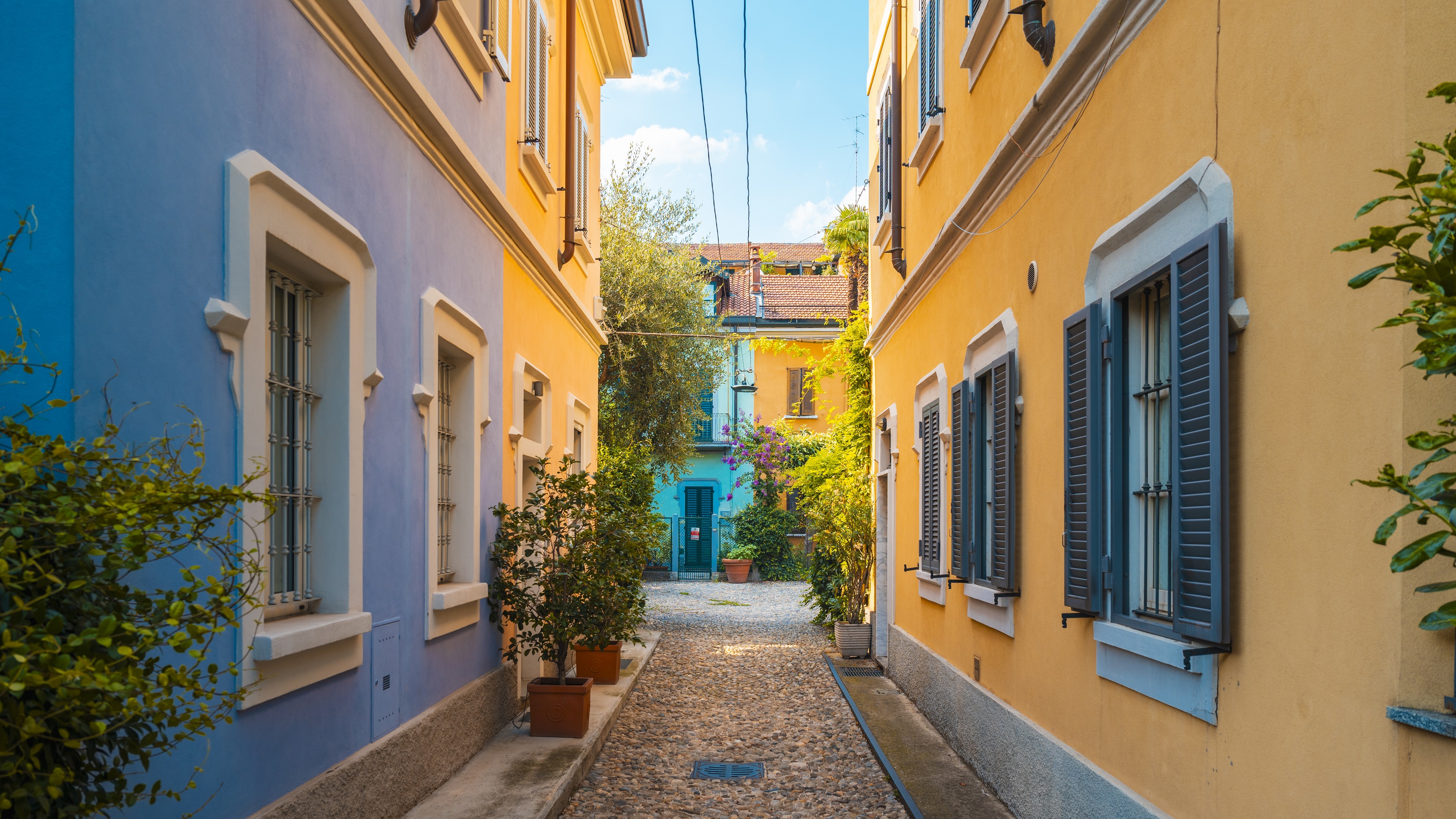Considering Purchasing and Renting a Property in Italy?
Owning a property in Italy where you can stay when you visit and rent out when you’re not there requires very careful planning.


Profit and prosper with the best of Kiplinger's advice on investing, taxes, retirement, personal finance and much more. Delivered daily. Enter your email in the box and click Sign Me Up.
You are now subscribed
Your newsletter sign-up was successful
Want to add more newsletters?

Delivered daily
Kiplinger Today
Profit and prosper with the best of Kiplinger's advice on investing, taxes, retirement, personal finance and much more delivered daily. Smart money moves start here.

Sent five days a week
Kiplinger A Step Ahead
Get practical help to make better financial decisions in your everyday life, from spending to savings on top deals.

Delivered daily
Kiplinger Closing Bell
Get today's biggest financial and investing headlines delivered to your inbox every day the U.S. stock market is open.

Sent twice a week
Kiplinger Adviser Intel
Financial pros across the country share best practices and fresh tactics to preserve and grow your wealth.

Delivered weekly
Kiplinger Tax Tips
Trim your federal and state tax bills with practical tax-planning and tax-cutting strategies.

Sent twice a week
Kiplinger Retirement Tips
Your twice-a-week guide to planning and enjoying a financially secure and richly rewarding retirement

Sent bimonthly.
Kiplinger Adviser Angle
Insights for advisers, wealth managers and other financial professionals.

Sent twice a week
Kiplinger Investing Weekly
Your twice-a-week roundup of promising stocks, funds, companies and industries you should consider, ones you should avoid, and why.

Sent weekly for six weeks
Kiplinger Invest for Retirement
Your step-by-step six-part series on how to invest for retirement, from devising a successful strategy to exactly which investments to choose.
In the book The 7 Habits of Highly Effective People, author Stephen Covey lists habit No. 2 as “Begin With the End in Mind,” suggesting that effective individuals must have a clear vision of their destination before embarking on any endeavor. Purchasing a property in Italy to rent is no exception.
Renting a property implies, on the financial side, greater attention on the return of our investment and, on the legal and logistical side, an understanding of the different rental contracts available in Italy, alongside the ability to effectively provide the support that tenants expect.
Let’s start with the financial side.
From just $107.88 $24.99 for Kiplinger Personal Finance
Become a smarter, better informed investor. Subscribe from just $107.88 $24.99, plus get up to 4 Special Issues

Sign up for Kiplinger’s Free Newsletters
Profit and prosper with the best of expert advice on investing, taxes, retirement, personal finance and more - straight to your e-mail.
Profit and prosper with the best of expert advice - straight to your e-mail.
In my professional experience, I have seen countless buyers thinking about the rental aspect as a “cherry on top” factor. In their mind, they will buy a property they like, and they will also have the option of renting it out to an unspecified tenant and for an unspecified amount. This thinking process rarely leads to optimal results, and it must be flipped on its head.
In the spirit of beginning with the end in mind, we must first think about the different rental options and their expected yield first, to identify a model property that would fit our financial criteria. Within this newly formed group, we can then proceed to pick a property we like.
Transaction costs
In a return-on-investment-driven purchase, transaction costs matter a lot. In Italy, taxes on property purchases are higher for second homes (9%) than for first homes (2%). While the taxable amount is calculated by the Italian tax agency on a lower-than-market value figure, it can easily reach the $10,000 to $20,000 range on most purchases.
On top of that, if the purchase goes through an agent, an up to 4% plus VAT (currently 22%) professional fee will be added to the final bill. Lastly, every purchase must be formalized by a public notary, whose costs are also entirely borne by the buyer and will set you back $2,000 to $3,000 plus VAT on average. In addition, optional expenses for a property inspection, renovations and furnishing may have to be taken into account.
On top of these one-off costs, ongoing property expenses must be considered. These include the annual property tax (IMU), the council or waste tax (TARI) and the condominium expenses (assuming an apartment is purchased). The latter can be very high for properties that have, for example, a centralized heating system, elevators or reception services and are shared by every owner proportionally to the size of their property.
It is therefore very important to look at expenses for at least the past two years and to access the minutes of the condominium meetings to check if any big renovation/maintenance of the common areas (roof, facades, staircases) have been discussed, as these costs will also be shared proportionately.
How rental property works in Italy
The second step of the process requires understanding the legal framework for rentals in Italy.
To start, I would personally suggest avoiding renting out a property long term (i.e. over 18 months). Italian rental laws are extremely asymmetric and tend to protect tenants even if they stop paying rent. This situation is exacerbated by the sluggishness of Italian courts in delivering and enforcing their judgments, leaving property owners without a way to evict tenants for years.
That leaves essentially two viable options: transitory rental contracts and tourist short-term rentals.
Transitory rental contracts are an option designed to offer temporary accommodation between one and 18 consecutive months. While they do not offer tenants the same protection as long-term rental contracts, they are subject to very strict and specific conditions: Rent is controlled; only tenants with specific transitory work, health or family reasons can enter such contracts, and only a government-approved contract template can be used.
Any violation of these conditions automatically converts a transitory contract into a long-term rental contract.
The tourist short-term rental option is, generally, the one foreign owners tend to pick, as it gives them the possibility to enjoy their property while generating income when it is not used. But this is not without potential pitfalls.
In recent years, the Italian government and local administrations have increased the administrative oversight on short-term rentals, requiring licensing and authorizations from the municipality, the police and the Ministry of Tourism. Safety prescriptions have been broadened to almost match those applicable to hotels. Taxes have been increased on the income generated from the second short-term rental property onward.
None of this applies to long-term or transitory rental contracts.
About short-term rentals
Short-term rentals also require a very hands-on approach and a range of trusted providers (cleaners, laundry, handymen) to ensure an appropriate level of service. For this reason, most foreign owners rely on local property managers to run their properties, but their fees (ranging from 25% to 30% plus VAT) can dent the overall profitability of the operation, as such expenses — for Italian tax purposes — cannot normally be deducted from the income generated by the property, nor can the electricity, gas and water bills or the condominium expenses.
Purchasing and renting a property in Italy can be extremely rewarding from both a personal and a financial side, but it is a task that requires careful planning and likely the assistance of a local professional to ensure your investment will truly work for you.
Related Content
- Want to Retire Abroad? Five Things to Know About Your Money
- Five Things I Wish I’d Known Before I Retired
- The Five Stages of Retirement (and How to Skip Three of Them)
- Six Financial Actions to Take the Year Before Retirement
- Retirees’ Anti-Bucket List: 10 Experiences You Don’t Want
Profit and prosper with the best of Kiplinger's advice on investing, taxes, retirement, personal finance and much more. Delivered daily. Enter your email in the box and click Sign Me Up.

Davide is an Italian qualified lawyer with over 10 years of experience within the insurance, real estate and litigation industry both in Italy and the United Kingdom. During the last couple of years, Davide worked as a real estate broker specifically assisting foreign buyers in Italy, performing legal and technical due diligence on real estate transactions, drafting the relevant contractual documentation and, in general, acting as buyer’s agent throughout the pre- and post-sale processes.
-
 Quiz: Do You Know How to Avoid the "Medigap Trap?"
Quiz: Do You Know How to Avoid the "Medigap Trap?"Quiz Test your basic knowledge of the "Medigap Trap" in our quick quiz.
-
 5 Top Tax-Efficient Mutual Funds for Smarter Investing
5 Top Tax-Efficient Mutual Funds for Smarter InvestingMutual funds are many things, but "tax-friendly" usually isn't one of them. These are the exceptions.
-
 AI Sparks Existential Crisis for Software Stocks
AI Sparks Existential Crisis for Software StocksThe Kiplinger Letter Fears that SaaS subscription software could be rendered obsolete by artificial intelligence make investors jittery.
-
 Social Security Break-Even Math Is Helpful, But Don't Let It Dictate When You'll File
Social Security Break-Even Math Is Helpful, But Don't Let It Dictate When You'll FileYour Social Security break-even age tells you how long you'd need to live for delaying to pay off, but shouldn't be the sole basis for deciding when to claim.
-
 I'm an Opportunity Zone Pro: This Is How to Deliver Roth-Like Tax-Free Growth (Without Contribution Limits)
I'm an Opportunity Zone Pro: This Is How to Deliver Roth-Like Tax-Free Growth (Without Contribution Limits)Investors who combine Roth IRAs, the gold standard of tax-free savings, with qualified opportunity funds could enjoy decades of tax-free growth.
-
 One of the Most Powerful Wealth-Building Moves a Woman Can Make: A Midcareer Pivot
One of the Most Powerful Wealth-Building Moves a Woman Can Make: A Midcareer PivotIf it feels like you can't sustain what you're doing for the next 20 years, it's time for an honest look at what's draining you and what energizes you.
-
 I'm a Wealth Adviser Obsessed With Mahjong: Here Are 8 Ways It Can Teach Us How to Manage Our Money
I'm a Wealth Adviser Obsessed With Mahjong: Here Are 8 Ways It Can Teach Us How to Manage Our MoneyThis increasingly popular Chinese game can teach us not only how to help manage our money but also how important it is to connect with other people.
-
 Looking for a Financial Book That Won't Put Your Young Adult to Sleep? This One Makes 'Cents'
Looking for a Financial Book That Won't Put Your Young Adult to Sleep? This One Makes 'Cents'"Wealth Your Way" by Cosmo DeStefano offers a highly accessible guide for young adults and their parents on building wealth through simple, consistent habits.
-
 Global Uncertainty Has Investors Running Scared: This Is How Advisers Can Reassure Them
Global Uncertainty Has Investors Running Scared: This Is How Advisers Can Reassure ThemHow can advisers reassure clients nervous about their plans in an increasingly complex and rapidly changing world? This conversational framework provides the key.
-
 I'm a Real Estate Investing Pro: This Is How to Use 1031 Exchanges to Scale Up Your Real Estate Empire
I'm a Real Estate Investing Pro: This Is How to Use 1031 Exchanges to Scale Up Your Real Estate EmpireSmall rental properties can be excellent investments, but you can use 1031 exchanges to transition to commercial real estate for bigger wealth-building.
-
 Should You Jump on the Roth Conversion Bandwagon? A Financial Adviser Weighs In
Should You Jump on the Roth Conversion Bandwagon? A Financial Adviser Weighs InRoth conversions are all the rage, but what works well for one household can cause financial strain for another. This is what you should consider before moving ahead.